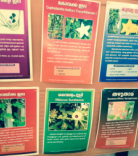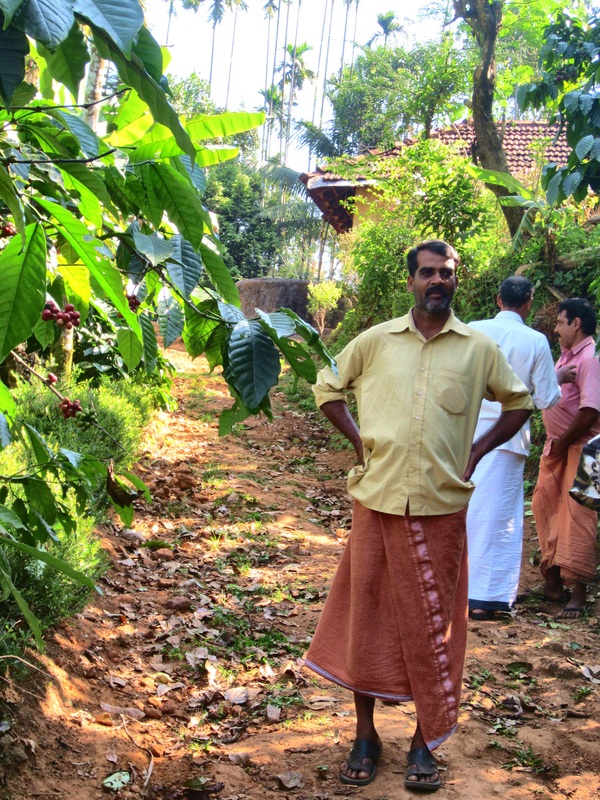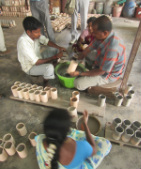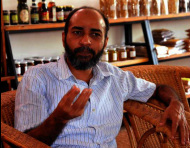Rick and Sue Channing write:
We were privileged to have been part of a group of 12 enthusiasts who travelled on a Traidcraft Meet the People* tour of South India in January 2014.
It being our first time in India we were stunned by the vibrant, colourful assault on the senses which accompanies a busy Airport. However, we were soon whisked away into the hills of the Western Ghats. The first few days of a jam-packed itinerary were spent visiting smallholder farmers in the hills of North Kerala. All were members of Fair Trade Alliance Kerala (FTAK).
Acting together in the FTAK cooperative they produce their range of crops and their Fairtrade certification ensures them a minimum price and therefore some stability when the commodities markets can vary so greatly.
We were privileged to have been part of a group of 12 enthusiasts who travelled on a Traidcraft Meet the People* tour of South India in January 2014.
It being our first time in India we were stunned by the vibrant, colourful assault on the senses which accompanies a busy Airport. However, we were soon whisked away into the hills of the Western Ghats. The first few days of a jam-packed itinerary were spent visiting smallholder farmers in the hills of North Kerala. All were members of Fair Trade Alliance Kerala (FTAK).
Acting together in the FTAK cooperative they produce their range of crops and their Fairtrade certification ensures them a minimum price and therefore some stability when the commodities markets can vary so greatly.
|
Acting together in the FTAK cooperative they produce their range of crops and their Fairtrade certification ensures them a minimum price and therefore some stability when the commodities markets can vary so greatly.
In an area under threat of deforestation and the commercial use of the natural forest, the farmers of organic coffee, cashew nuts, spices and coconuts see themselves as guardians of one of the most important areas of biodiversity in India. |
|
We were fortunate to be able to meet Tomy Mathews the founder and driving force behind FTAK. He acknowledged how important Fairtrade was to them but expressed some concern that some big global companies were now certified Fairtrade for their chocolate. On the one hand this is good for their cocoa producers, but he worries about the influence they may have over the Fairtrade brand. His aim for FTAK is to go beyond the Fairtrade minimum standards to what he calls “Fairtrade + 3”, the three extra elements being biodiversity, organic farming and gender equality. All the farmers we visited were committed to this. They were especially keen to show us the ingenious ways they had invented in order to be self sufficient. (One farmer was cooking with gas produced by his cow!)
|
The tour continued with a remarkable blend of the tourist sights and Traidcraft projects: from traditional dancing to a tea plantation, overnight boat trip on the backwaters of Kerala to a wildlife sanctuary, from elephant rides to staying at an orphanage, visiting Ancient Hindu Temples to a pottery in Tamil Nadu.
|
The pottery visit, in a village outside Chennai (Madras) summed up for me the ethos of Traidcraft. At first, a lot of interest was shown by several big retailers but when the pots had some quality issues the big companies backed out. Traidcraft, however, contacted Sunderland University who sent out a team to help them resolve those issues and to continue to work alongside them as they now grow and expand.
|
As we went from place to place we were inspired by all those we met who were determined to improve their communities and who were full of praise for their Traidcraft partners. At the end of our 16 day tour we were all determined to look out for the Fairtrade label and to support Traidcraft in our churches and local communities.
Rick & Sue Feb 2014
Rick & Sue Feb 2014
There are “meet the people” tours to Bangladesh, Chile, Costa Rica & Nicaragua, Cuba, Ghana, India - Southern, Western and Northern separately - Kenya, Nepal, Peru, Philippines, South Africa, Sri Lanka Thailand and Vietnam. Find the full programme of tours for 2014 and the newly released dates for tours in 2015 on the Skedaddle website.
|
The Fairtrade Foundation has profiled Tomy
Mathew and has asked him some questions about coffee farming. He talks about cashew nuts on youtube and has written an article on co-operatives for the United Nations. It's longish (10 pages) but interesting and thought-provoking. |
FTAK now boasts a membership that exceeds 4,500 farming families. It is not the only Fair Trade co-operative that has initiated specific programmess to protect the biodiversity of their regions, ensure that their members have access to diverse sources of locally-produced, nutritious food and recognize and actively promote the role of women in all areas of family, co-operative, and community life. Many fair trade co-ops carry out programmes in some of these areas. However, by consciously articulating their Fair Trade + 3 Initiative in their mission statement, FTAK sends a strong message to their members and the world about their values and priorities. By elevating these issues to the same level as their fair trade programme, the forward-thinking Kerala farmers demonstrate that women, the environment, and food security are three interwoven strands, interdependent and of equal importance. Fair Trade is a tool, but a successful co-operative needs many tools in its toolbox.
As Rick has written, environmental protection is one of the of those +3. Some of the premiums have paid for solar powered electric fencing to protect farms on the edge of woodland from the local elephants. The fences provide only a mild shock to deter the animals and prevent the destruction of their crops - elephant-friendly cashew nuts!
Individually, the FTAK farmers don’t own much land, but what they lack in acreage, they make up for in biodiversity. An average FTAK farmer may have as many as 85 different crops and plants on his or her farm, including herbs and spices, vegetables, coffee, tea, cacao, henna, cashew, coconut, and other fruit trees. In addition to those plants they intentionally cultivate for personal consumption and income generation, there are many plants that grow wild on the farms.
“Seed Exchange” is one of the most important events that FTAK organizes as part of their +3. Farmers from all over Kerala save their best seeds throughout the year in anticipation of this agricultural fair. Each January, they then come together to trade seeds, learn new farming techniques, and buy and sell livestock and domesticated animals.
As Rick has written, environmental protection is one of the of those +3. Some of the premiums have paid for solar powered electric fencing to protect farms on the edge of woodland from the local elephants. The fences provide only a mild shock to deter the animals and prevent the destruction of their crops - elephant-friendly cashew nuts!
Individually, the FTAK farmers don’t own much land, but what they lack in acreage, they make up for in biodiversity. An average FTAK farmer may have as many as 85 different crops and plants on his or her farm, including herbs and spices, vegetables, coffee, tea, cacao, henna, cashew, coconut, and other fruit trees. In addition to those plants they intentionally cultivate for personal consumption and income generation, there are many plants that grow wild on the farms.
“Seed Exchange” is one of the most important events that FTAK organizes as part of their +3. Farmers from all over Kerala save their best seeds throughout the year in anticipation of this agricultural fair. Each January, they then come together to trade seeds, learn new farming techniques, and buy and sell livestock and domesticated animals.





